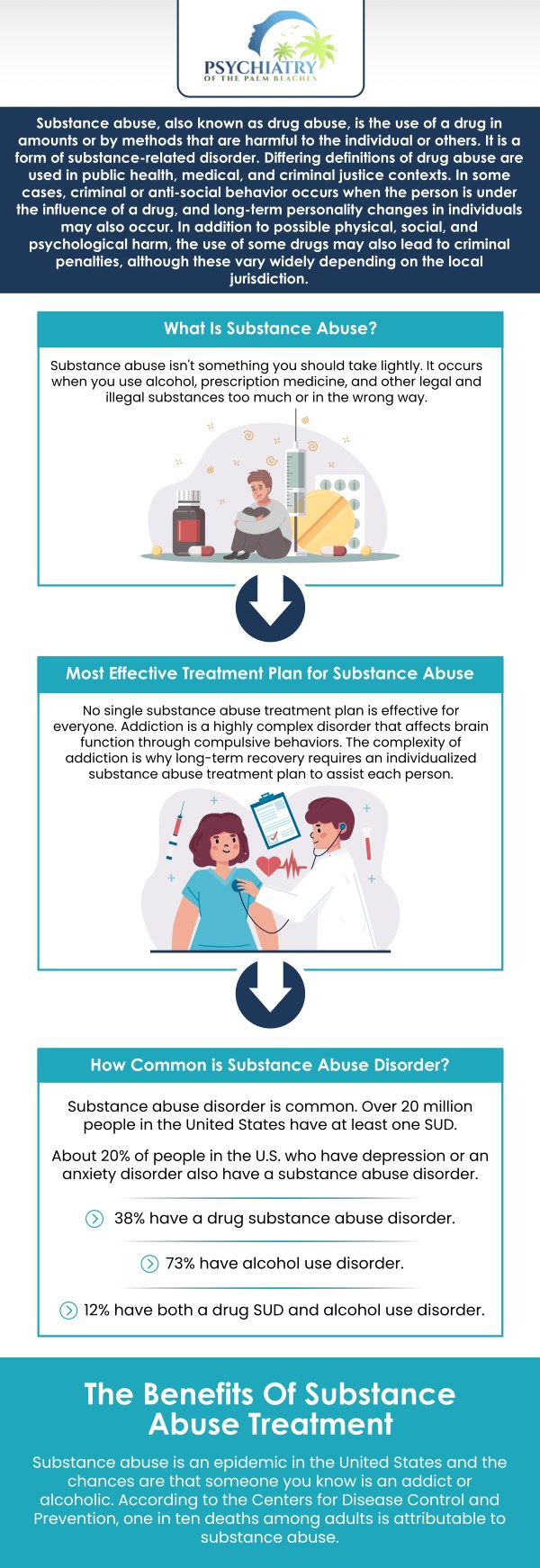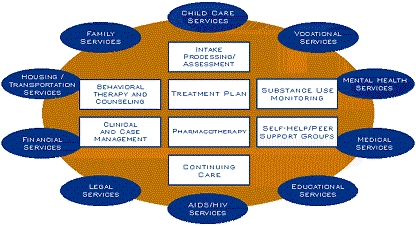Comprehensive Overview to Substance Abuse Treatment: Comprehending, Strategies, and Long Lasting Recuperation
Drug abuse refers to the hazardous or dangerous use psychoactive materials, including alcohol and illicit drugs. It is not merely an issue of willpower or bad decision-making-- it's a complicated problem influenced by organic, mental, and social factors. People struggling with Substance Abuse often experience uncontrollable drug-seeking actions despite adverse consequences in their individual, expert, and social lives. Gradually, these materials can modify brain feature, harm judgment, and produce physical and psychological dependency. Recognizing the nature of Substance Abuse is the very first action toward addressing it efficiently.
The reasons for chemical abuse are complex. Genetics, mental health and wellness disorders, ecological stress, trauma, and exposure to substances at an early age can all contribute to the development of dependency. It is frequently interlinked with conditions such as depression, anxiousness, or trauma (PTSD) For numerous people, alcohol and drugs end up being coping systems-- tools to leave psychological pain or stress. This short-term relief swiftly offers way to lasting consequences, as resistance develops and the individual needs even more of the Substance to achieve the same impact. (substance abuse treatment Morris County)
Recognizing the indicators important Abuse beforehand can avoid the problem from escalating. Common caution signs consist of adjustments in habits, forget of responsibilities, withdrawal from enjoyed ones, monetary troubles, and physical signs and symptoms such as fat burning, tiredness, or bad hygiene. When left untreated, chemical abuse can result in serious health and wellness difficulties, damaged relationships, and even premature fatality. Early treatment and accessibility to therapy are crucial for people having a hard time with addiction.
The Value of Seeking Substance Abuse Therapy
Seeking expert treatment for drug abuse is just one of one of the most important decisions an individual can make for their health and future - addiction treatment. Addiction is not something that can be overcome by willpower alone-- it requires structured treatment, advice, and consistent support. Therapy programs are made to deal with both the physical reliance and the underlying emotional or psychological issues that drive habit forming behaviors. Without treatment, the cycle of regression and self-destruction commonly proceeds, placing the individual's life and well-being at threat
The relevance of expert treatment depends on its capability to offer a safe and controlled atmosphere for recovery. During detoxification, physician aid individuals take care of withdrawal signs and symptoms that can be possibly dangerous and unpleasant. After detox, therapy and therapy sessions enable individuals to challenge the origin of their addiction, establish dealing abilities, and rebuild their feeling of self-worth. Therapy also assists re-establish healthy regimens, structure, and liability-- every one of which are crucial for lasting recovery.
Past the physical and psychological facets, chemical abuse treatment plays a substantial duty in restoring partnerships and social performance. Dependency frequently leads to damaged count on, isolation, and stressed family members dynamics. Through family members treatment and team sessions, individuals can rebuild interaction and reconnect with enjoyed ones. By including member of the family in the recuperation process, therapy programs strengthen the assistance network required for maintaining soberness. Basically, seeking therapy is not just regarding giving up medicines or alcohol-- it has to do with recovering one's life and producing a structure for a much healthier, more fulfilling future.
Types of Drug Abuse Treatment Programs
There is no one-size-fits-all technique to dealing with dependency. Each person's trip is special, therefore are their therapy needs. Chemical abuse therapy programs can be classified into numerous types, ranging from inpatient recovery to outpatient therapy and holistic care. The selection of therapy depends upon elements such as the extent of addiction, the visibility of co-occurring mental health and wellness disorders, and the person's way of living and support group.
Inpatient or Residential Treatment offers a very organized atmosphere where individuals stay in a treatment facility for a details period, typically in between 30 and 90 days. This kind of program uses day-and-night clinical supervision and extensive therapy sessions. It's suitable for people with serious addictions or those who have slipped back numerous times. Inpatient care gets rid of the individual from daily triggers and lures, permitting them to concentrate solely on recovery. Treatments may consist of cognitive-behavioral treatment (CBT), dialectical behavior therapy (DBT), and group counseling, all focused on aiding individuals recognize and manage their dependency.
Outpatient Therapy Programs use even more flexibility, permitting individuals to continue with their day-to-day responsibilities while going to set up treatment sessions. This technique is frequently appropriate for people with light to moderate dependencies or as a step-down stage after finishing inpatient rehab. Outpatient programs emphasize liability and lasting regression avoidance approaches. They may consist of specific therapy, medication-assisted therapy (MAT), and support groups such as Narcotics Anonymous (NA) or Twelve Step Programs (AA)
Along with these, alternate and alternative therapies are coming to be significantly prominent. These programs attend to the spirit, mind, and body connection by integrating techniques such as yoga, meditation, art therapy, and dietary therapy. Several facilities additionally use dual-diagnosis therapy for those dealing with both dependency and psychological health and wellness problems. This detailed method guarantees that the individual gets well-rounded care that promotes healing on multiple degrees.
The Benefits of Substance Abuse Treatment
The advantages of undertaking chemical abuse therapy extend much beyond staying away from drugs or alcohol. Among one of the most instant benefits is improved physical health and wellness. Lasting drug abuse takes a toll on read what he said the body, influencing essential organs such as the heart, brain, and liver. Through cleansing and treatment, the body starts to repair itself, leading to much better power levels, improved sleep, and a stronger immune system. Nutrition and health and fitness programs within rehab centers better enhance physical recovery.
Emotional and psychological health benefits are just as considerable. Addiction frequently masks underlying emotional problems that need to be attended to. During therapy, people access to qualified specialists and counselors who help them browse sensations of embarassment, shame, or trauma. By establishing emotional recognition and strength, people learn healthier ways to handle anxiety and triggers. Cognitive-behavioral therapy (CBT) and various other evidence-based strategies encourage clients to change negative idea patterns that add to relapse.

Evidence-Based Strategies in Modern Addiction Therapy
Today's drug abuse treatment techniques are based in scientific research and medical practice. Evidence-based treatments guarantee that individuals get treatments proven to be effective. Among one of the most widely used methods is Cognitive-Behavioral Therapy (CBT), which aids people transform and recognize believed patterns that lead to Substance usage. By comprehending the connection in between feelings, behaviors, and thoughts, people can find out to deal with triggers in much healthier ways - Inpatient rehab. CBT is often integrated with other treatments to address co-occurring disorders such as depression or anxiousness
One more reliable strategy is Medication-Assisted Therapy (MAT), specifically for opioid and alcohol dependency. MAT uses FDA-approved medicines such as naltrexone, buprenorphine, or methadone to reduce food cravings and withdrawal signs. When integrated with counseling and behavior therapy, floor covering significantly enhances treatment retention and minimizes relapse rates. It allows people to support their lives while concentrating on emotional recovery and reconstructing partnerships.
Group and household treatment are additionally indispensable parts of evidence-based therapy. Group sessions create a space for individuals to share their tales and acquire understandings from others in recovery. Family treatment, on the other hand, addresses the relational damage triggered by addiction. It helps liked ones recognize the nature of the illness and equips them with tools to give support while establishing healthy borders. These cumulative therapeutic approaches reinforce the recovery procedure and promote long-lasting recovery.
Constructing a Life After Treatment: Maintaining Long-Term Recovery
Recovery does not end after completing a therapy program-- it's a long-lasting journey that calls for dedication, discipline, and recurring assistance. Transitioning back to day-to-day life can be difficult, as people are confronted with triggers, stressors, and obligations that can test their sobriety. This is where aftercare programs play a crucial duty. Aftercare may consist of recurring treatment, peer support system, sober living setups, and regression prevention planning. The goal is to assist people preserve the development they've made and avoid sliding back into old patterns.
Establishing a new lifestyle focused on health and wellness and function is crucial for long-term success. Many individuals find satisfaction by going after pastimes, fitness routines, education and learning, or volunteer work. Constructing an organized daily routine assists prevent try this dullness-- an usual trigger for regression. Reconnecting with household, fixing connections, and surrounding oneself with favorable impacts better strengthens a healthy way of living. It's also crucial to recognize that troubles can take place, however they check this site out don't specify the individual's trip. What matters most is the determination to look for assistance and continue moving on.
Eventually, sustained recuperation has to do with improvement-- physically, emotionally, and emotionally. It entails redefining one's identification and finding definition past dependency. Individuals that commit to lasting recuperation typically become supporters, coaches, or assistance figures for others fighting with chemical abuse. Their stories of durability function as powerful reminders that recovery is possible. With the appropriate treatment, assistance, and attitude, any individual can overcome dependency and construct a satisfying, substance-free life.
Final thought: A Course Towards Healing and Hope

Seeking expert treatment for Substance Abuse is one of the most critical decisions an individual can make for their wellness and future. Beyond the physical and emotional elements, Substance Abuse therapy plays a significant function in recovering connections and social performance. Substance Abuse therapy programs can be categorized into several types, varying from inpatient rehabilitation to outpatient therapy and holistic care. Inpatient or Residential Treatment provides an extremely organized setting where clients live in a treatment facility for a particular period, generally between 30 and 90 days. The benefits of going through Substance Abuse therapy extend much past staying away from drugs or alcohol.